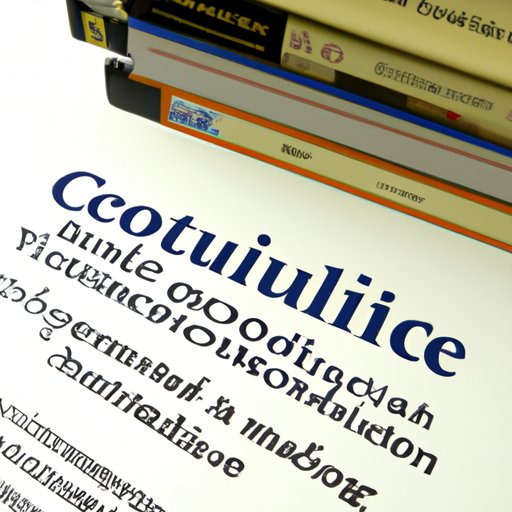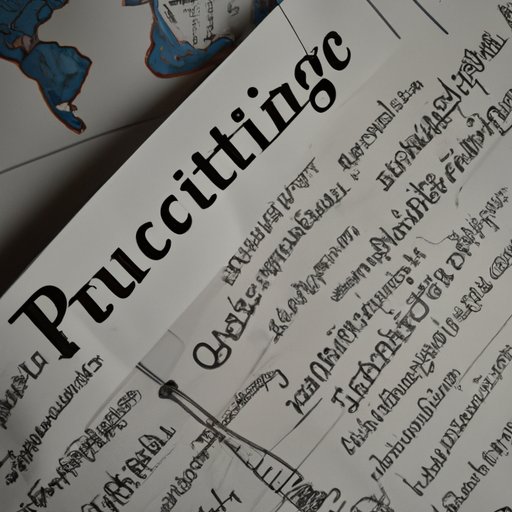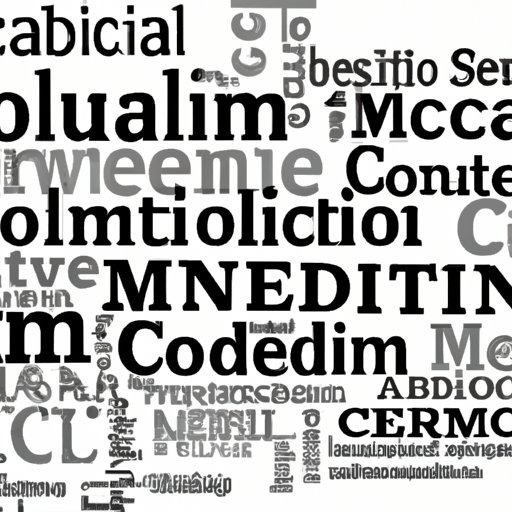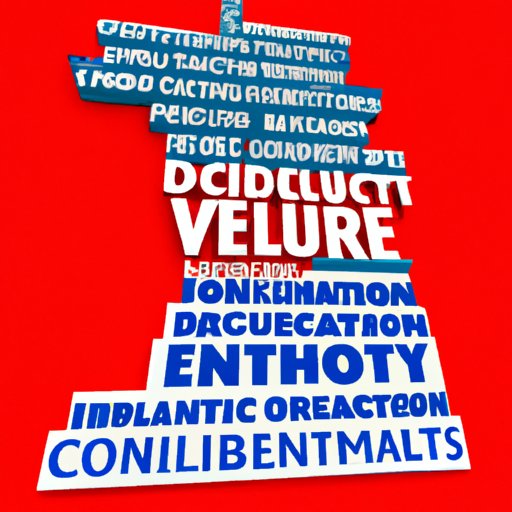Introduction
Political culture is a complex concept that has been studied by social scientists for many years. In its simplest terms, political culture refers to the beliefs, values, and attitudes that individuals have about politics and the government. It encompasses both the shared and individual views of citizens and their collective understanding of the political system. As such, it plays an important role in how people interact with one another and shape their political environment.
The purpose of this article is to provide an overview of what political culture is and examine the different components of political culture. We will also explore some examples of political culture around the world, analyze the impact of political culture on politics and society, investigate the role of media in shaping political culture, and understand the relationship between political culture and ideology. Finally, we will look at the interplay between political culture and political systems.

Examining the Components of Political Culture
Political culture can be broken down into three main components: cultural values, norms and beliefs, and symbols.
Cultural Values
Cultural values refer to the fundamental principles that guide people’s behavior and influence their decisions. These values are typically expressed through laws, customs, traditions, and religious practices. According to a study conducted by the University of Maryland, some common cultural values include respect for authority, equality, fairness, justice, and compassion for others.
Norms and Beliefs
Norms and beliefs are the shared expectations and convictions that people have about the political system and its institutions. They reflect the way people think about politics, their level of trust in the government, and their willingness to participate in the political process. Research has shown that these norms and beliefs can vary greatly from country to country.
Symbols
Symbols are visual representations that signify certain ideas or concepts. They are often used in political contexts to communicate messages and evoke emotions. Common symbols associated with political culture include flags, anthems, national holidays, and monuments.

Exploring Examples of Political Cultures Around the World
Political culture can differ significantly from country to country. To get a better understanding of how it works, let’s take a look at some examples of political cultures around the world.
United States
In the United States, the political culture is characterized by a strong belief in individualism and democracy. Citizens have a high degree of trust in the government and are actively involved in the political process. This is reflected in the country’s democratic institutions and practices, such as free and fair elections, freedom of speech, and the rule of law.
China
China has a very different political culture than the United States. The Chinese people have a more collectivist outlook and place a strong emphasis on obedience to authority. There is less trust in government institutions and less political participation from citizens. The country is ruled by a single-party authoritarian regime, which has a strict control over the media and other forms of expression.
France
In France, the political culture is shaped by a long history of monarchy and revolution. French citizens have a strong sense of national identity and pride in their culture and language. They are also highly engaged in the political process and value the importance of dialogue and compromise. The country is a representative democracy, with a strong emphasis on the separation of powers.
The Impact of Political Culture on Politics and Society
Political culture has a significant impact on politics and society. It shapes the way people interact with each other and influences their decision-making. Let’s take a look at some of the ways political culture impacts politics and society.
Influence on Decision-Making
Political culture can affect the way people make decisions. For example, individuals in countries with a strong sense of individualism may be more likely to make decisions based on personal preferences, while those in countries with a more collectivist outlook may be more likely to defer to the group. Research has also shown that political culture can influence the type of policies that governments pursue. For example, a study conducted by the University of California found that countries with a higher level of trust in government institutions were more likely to adopt policies that promote economic growth.
Role in Conflict Resolution
Political culture also plays an important role in conflict resolution. It can shape the way people approach disputes and determine the types of solutions they are willing to accept. According to research conducted by the International Institute for Sustainable Development, countries with a more cooperative political culture are more likely to engage in peaceful conflict resolution, while those with a more confrontational political culture may be inclined towards aggressive solutions.
Impact on Social Change
Political culture can also influence the speed and direction of social change. Individuals in countries with a strong commitment to democratic values may be more likely to embrace progressive reforms, while those in countries with a more conservative outlook may be slower to accept change. Additionally, research has shown that countries with a higher level of trust in government institutions are more likely to successfully implement new policies and regulations.

Investigating the Role of Media in Shaping Political Culture
The media plays an important role in shaping political culture. It can be used to spread information, influence public opinion, and manipulate people’s views on issues. Let’s take a closer look at the role of media in shaping political culture.
Media as a Tool for Manipulation
The media can be used as a tool for manipulation. Governments and political parties can use it to spread propaganda and sway public opinion in their favor. They can also use it to suppress dissenting voices and create a false reality. For example, a study conducted by the University of Oxford found that authoritarian regimes are more likely to control the media in order to limit access to information and shape public discourse.
Role of News Coverage
News coverage can also have an impact on political culture. It can shape the way people perceive events and influence their opinions on various issues. A study conducted by the University of Pennsylvania found that news coverage of political events can influence people’s views on the legitimacy of the government and the efficacy of its policies.
Analyzing the Relationship Between Political Culture and Ideology
Political culture and ideology are closely related. Ideology is a set of beliefs and values that shape people’s attitudes towards politics and society. It can have a major impact on political culture and vice versa. Let’s take a look at the relationship between political culture and ideology.
Conservative vs. Liberal Ideologies
Conservative and liberal ideologies are two of the most prominent political ideologies. Conservatives tend to emphasize traditional values and support limited government intervention. Liberals, on the other hand, tend to be more open to progressive reforms and advocate for a larger role for the government in society. Research has shown that countries with a strong conservative political culture are more likely to oppose progressive reforms, while those with a more liberal political culture are more likely to embrace them.
Moderates and Other Ideologies
There are also other ideologies, such as moderates, who fall somewhere between conservatives and liberals. They tend to be more pragmatic and focus on finding solutions that are acceptable to all sides. Additionally, there are other ideologies, such as socialism and anarchism, that have their own distinct views on politics and society. Research has shown that these ideologies can have a significant impact on political culture.
Understanding the Interplay Between Political Culture and Political Systems
Political culture and political systems are closely intertwined. Political systems define the rules and structures that shape politics and society, while political culture determines how people interact within those systems. Let’s take a look at the relationship between political culture and political systems.
Democracy
In democracies, political culture is shaped by the values of freedom and equality. Citizens have a high degree of trust in the government and actively participate in the political process. Democracies tend to have a more open and tolerant political culture, as citizens are free to express their opinions without fear of retribution.
Autocracy
Autocracies are characterized by a lack of trust in government institutions and a strong emphasis on obedience to authority. Citizens have less freedom to express their opinions and are not actively involved in the political process. This type of political culture tends to discourage political participation and limit opportunities for social change.
Socialism
Socialist countries have a more collectivist outlook and tend to emphasize solidarity and cooperation. Citizens have a strong sense of loyalty to the state and are willing to make sacrifices for the greater good. This type of political culture can lead to a more equitable distribution of resources and greater economic stability.
Conclusion
Political culture is an important concept that shapes the way people interact with each other and influences their decision-making. It is formed by cultural values, norms and beliefs, and symbols, and can vary significantly from country to country. Political culture has a major impact on politics and society, and can be influenced by the media and different ideologies. Additionally, it is closely intertwined with political systems, such as democracy, autocracy, and socialism. Understanding political culture is essential for understanding politics and society.
(Note: Is this article not meeting your expectations? Do you have knowledge or insights to share? Unlock new opportunities and expand your reach by joining our authors team. Click Registration to join us and share your expertise with our readers.)
